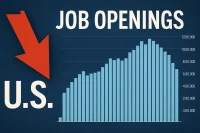A woman who claims she was denied a promotion and then demoted because she is straight has won support of Supreme Court judges.
The US Supreme Court appeared to lean toward easing the path for workplace discrimination claims brought by workers from majority groups, such as white or heterosexual employees.
The case, heard on Wednesday, involves Marlean Ames, an Ohio woman who alleges she was denied a promotion and later demoted because she is heterosexual.
Her appeal challenges existing legal standards that often require plaintiffs from majority groups to provide more evidence than minority plaintiffs when claiming workplace bias.
The justices, both conservative and liberal, suggested they may overturn a lower court ruling that dismissed her case.

The Case of Marlean Ames
Ames, 60, was an administrator at Ohio’s Department of Youth Services.
She claims she was passed over for a promotion in favor of a gay woman and later demoted in favor of a gay man.
According to Ames, both employees were less qualified than she was.
She filed a lawsuit in 2020 under Title VII of the Civil Rights Act, which prohibits workplace discrimination based on race, sex, religion, and other characteristics, including sexual orientation.
However, lower courts sided with the state, arguing that Ames failed to show that Ohio’s Department of Youth Services was an “unusual employer” that discriminates against majority-group workers.
The Sixth Circuit Court of Appeals ruled against Ames in 2023, stating that majority-group plaintiffs must meet a higher standard to prove discrimination since such cases are relatively rare. Ames appealed, arguing that this standard is unfair and should be removed.
Potential Impact on Workplace Discrimination Cases
If the Supreme Court rules in Ames’s favor, it could lead to a significant shift in how workplace discrimination lawsuits are handled. The key changes could include:
- Lowering the legal burden for majority-group workers filing discrimination claims.
- Increasing the number of lawsuits filed by white, male, or heterosexual employees.
- Scrutiny on diversity programs, which some conservative groups argue unfairly benefit minorities.
America First Legal, a conservative group founded by former Trump adviser Stephen Miller, supports Ames’s case. In a court filing, the group claimed that many companies give illegal preference to minority workers while excluding white, heterosexual, or male employees.
Hiring? Post jobs for free with WhatJobs
Justices Debate the Legal Standard
During Wednesday’s hearing, justices from both ideological sides questioned the fairness of the current legal standard.
- Justice Amy Coney Barrett asked whether removing the higher burden for majority-group plaintiffs would create a flood of discrimination lawsuits.
- Justice Ketanji Brown Jackson expressed concern that current laws place too heavy a burden on certain plaintiffs at the early stages of litigation.
- Justice Elena Kagan pointed out that Ohio’s legal team seemed to agree with Ames on the central issue: that majority-group plaintiffs should not face a higher burden than minority plaintiffs.
Ohio’s lawyer, Elliot Gaiser, argued that the state did not discriminate against Ames based on her sexual orientation.
He said there was no evidence that Ames’s supervisors knew her sexual orientation or that it played a role in employment decisions.
Need Career Advice? Get employment skills advice at all levels of your career
A Decision That Could Reshape Workplace Bias Laws
The Supreme Court’s ruling, expected later this year, could redefine workplace discrimination law.
A decision in Ames’s favor would likely remove the higher standard for majority-group plaintiffs, leading to a wave of new lawsuits.
Meanwhile, critics warn that such a ruling could weaken protections for historically disadvantaged groups and disrupt diversity, equity, and inclusion (DEI) initiatives. With DEI programs already facing political pushback, a decision in Ames’s favor could further challenge efforts to promote workplace diversity.
The case could mark a turning point in employment law, reshaping how discrimination is defined and litigated in the US.




